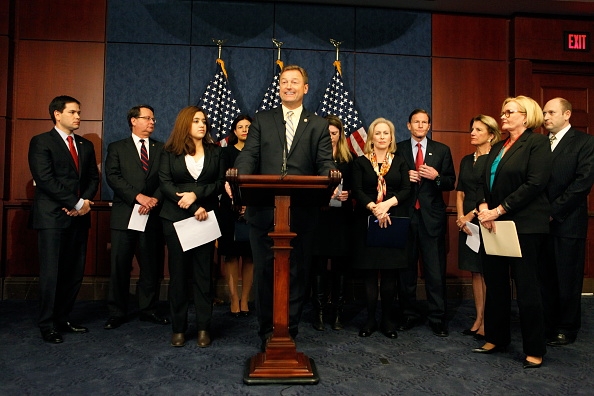You have /5 articles left.
Sign up for a free account or log in.

Members of Congress announce new version of legislation on sex assaults.
Getty Images
WASHINGTON -- The bipartisan group of U.S. senators that has been pushing legislation to curb campus sexual assaults is making some changes to their proposal as they look to advance the measure in the new Congress.
The sponsors of the legislation, who now include five Democrats and five Republicans, on Thursday unveiled a new version of their bill aimed at holding colleges more accountable for addressing sexual violence.
Those lawmakers said at a press conference that the revised proposal was a response to feedback from victims of sexual assault, advocates for the rights of accused students, law enforcement and college and university administrators.
“We have listened,” said Senator Claire McCaskill, the Missouri Democrat who is leading the effort. “Today’s bill is much stronger for it. We have improved it. We have made changes based on suggestions we have heard.”
McCaskill said the legislation would strengthen the rights of accused students, which critics have said are undermined by the bill.
“We are very focused on making sure there’s also due process,” she said.
A new provision in the bill would require colleges to notify both the victim and accused student within 24 hours of a college’s decision to move ahead with a disciplinary hearing for an allegation of sexual misconduct. The legislation also now describes students accused of sexual assault as “accused students” instead of “assailants.”
Joe Cohn, the legislative policy director at the Foundation for Individual Rights in Education, called some of those changes "an incremental step in the right direction."
But, he said, the proposal "still doesn't come anywhere close to striking a balance" between the rights of the complainant and the rights of the accused.
Elsewhere in the legislation are tweaks that appear to address some of the concerns colleges and universities have expressed about the bill.
The new draft, for instance, clarifies which law enforcement agencies colleges must sign an agreement to combat sexual assault with, as well as the role of the adviser that colleges would have to assign to a student making a complaint of sexual assault.
The legislation would now require colleges to anonymously survey their students about the prevalence of sexual assault once every two years instead of annually. The results of those surveys at each institution would be published online.
But much of the legislation, including requiring more sexual assault training on campuses, remains unchanged from when it was first announced last summer.
Colleges would still face stiffer financial penalties for mishandling sexual violence cases under the Clery Act and the gender equity law known as Title IX of the Education Amendments of 1972. The bill would allow the Department of Education to impose a fine as high as 1 percent of a college’s operating budget.
However, the proposal now calls for the revenue collected from those enhanced penalties to be used for a new grant program to help colleges to combat sexual assault rather than flowing back to the Department of Education office responsible for enforcement.
Some colleges and universities had argued that allowing revenue from penalties to flow directly back to the Department of Education might create a “bounty mind-set.”
Since the legislation was first unveiled last summer, some universities, like the State University of New York System, have embraced the proposal and adopted procedures that, in some cases, mirror the legislation. Other groups, such as the American Council on Education, said they were concerned that the proposal was too “heavy-handed” toward institutions.
Governors, state legislatures and individual institutions have also proposed and enacted new policies to deal with sexual assault in recent months.
Senator Richard Blumenthal of Connecticut, a Democrat, said that colleges and universities have been “taking some steps in the right direction” to address sexual assaults.
“There have been some reforms,” he said. “But there is so much work still to be done.”
Senator Kirsten Gillibrand, Democrat of New York, though, continued to take a harsher tone against how colleges are performing on the issue.
“The reason why schools are failing is that they do not take this crime seriously,” she said, adding that one-third of students found responsible for sexual violence by a college are not expelled from the institution.
The Senators cosponsoring the legislation said Thursday that they were optimistic they would be able to pass a version of the bill in the new Congress.
Senator Dean Heller of Nevada, the leading Republican cosponsor of the bill, said he discussed the bill with Senator Lamar Alexander of Tennessee, who chairs the Senate education committee and was interested in bringing the bill before that panel.
“This may not be the perfect piece of legislation that he may agree to,” Heller said, adding that “at the end of the day it may look a little different than what we have.”
McCaskill said in an interview that she, too, had spoken with Alexander about advancing the bill, and, in particular, the added requirements on colleges.
“We are open to his suggestions on how we can make it less burdensome,” she said.
In a statement provided by his office, Alexander said that he wanted to “ensure that regulations on colleges are effective for students.” He has made reducing federal requirements on colleges a priority as he works on a rewrite of the Higher Education Act.
“I look forward to working with Senators McCaskill, Heller and others to examine the best steps the federal government and our colleges and universities can take to help create a safe environment for students,” he said.




